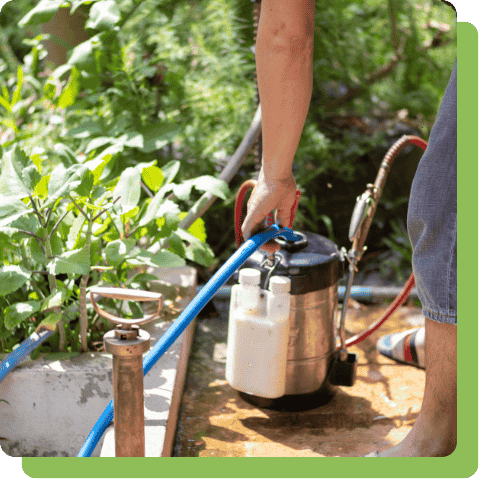
Discover the diverse applications of EM® products by Microzone, offering sustainable solutions in agriculture, animal husbandry, and environmental enhancement. Our anaerobically-fermented EM® blends, such as EM•1®, act as catalysts for soil health, improve fertilization efficacy, control odors in waste management, and contribute to organic composting. Certified for organic input, EM® proves versatile, whether applied directly or as a foundational element for developing cost-effective secondary products. Explore the array of ready-to-use solutions at Microzone, harnessing the natural power of EM® for a greener, healthier future.
Please contact Microzone for Application Guidelines or Technical advice on +27 (0) 66 529 0724 or info@microzone.co.za.


Incorporating Effective Microorganisms® (EM®) into your home garden offers a sustainable way to improve soil health, boost plant growth, and enhance resilience. Using EM® products helps reduce the need for chemicals and supports a greener, more productive garden.

Effective Microorganisms® (EM®) refer to a blend of beneficial microorganisms that work synergistically to enhance plant growth and improve soil health. These microorganisms include beneficial bacteria, fungi, yeasts, and other microbes. Here’s a breakdown of each component and how they contribute to promoting plant growth and soil fertility:


Effective Microorganisms® facilitate the breakdown of organic matter, recycling nutrients back into the soil for plants to use.
The activities of EM® beneficial microorganisms contribute to soil aggregation, aeration, and water retention, creating an optimal environment for plant roots.
Some microorganisms in EM® produce antimicrobial compounds or outcompete harmful pathogens, reducing the incidence of plant diseases.
By incorporating Effective Microorganisms® into gardening practices, such as through EM® solutions or composting with EM®, gardeners can harness the power of these beneficial microbes to create healthier, more resilient plants and improve overall soil fertility and structure.

Incorporating Effective Microorganisms® (EM®) into gardening practices offers numerous advantages for plant health, soil fertility, and environmental sustainability. Here’s how EM® can transform your garden:
EM® enhances soil health by promoting the decomposition of organic matter, releasing essential nutrients like nitrogen, phosphorus, and potassium. This process enriches the soil and ensures a steady supply of nutrients for plants. The beneficial bacteria in EM® produce organic acids that help break down mineral nutrients, making them more accessible to plants.
EM® supports a symbiotic relationship between mycorrhizal fungi and plant roots, improving the uptake of key nutrients such as phosphorus and water. This leads to healthier plants and better growth. EM® also helps improve soil structure, which aids in root development and nutrient absorption.
The beneficial microorganisms in EM® compete with and suppress harmful pathogens, reducing plant diseases. Some of these microbes produce antimicrobial compounds that inhibit pathogens, providing natural protection for plants and reducing the need for chemical pesticides.
With improved soil fertility and nutrient uptake, plants treated with EM® grow stronger and more vigorously. This results in better flowering, fruiting, and overall yield. EM® promotes robust root systems, which improves nutrient and water absorption, leading to healthier and more productive plants.
EM® reduces reliance on synthetic fertilizers and pesticides, supporting eco-friendly gardening practices. It enhances soil biodiversity and reduces the negative impacts of chemicals on beneficial soil organisms and wildlife. Using EM® promotes a more sustainable and resilient garden ecosystem.
EM® accelerates the breakdown of organic matter in composting, reduces odours, and speeds up compost production. This helps manage garden waste more efficiently and improves compost quality, which in turn benefits soil health.

By integrating EM® into your gardening routine, whether through composting, soil conditioning, or plant care, you can achieve a thriving garden with healthier plants, improved soil quality, and a more sustainable approach to gardening.


Application of EM® Technology
C:N Ratio Optimization
Choice of Composting Method

Conduct soil tests periodically to assess nutrient levels, pH, and overall soil health. This information helps you make informed decisions about nutrient amendments and EM® application rates.
Observe plant growth and health indicators such as leaf color, growth rates, and pest/disease occurrences. Healthy plants are a good sign of balanced soil and microbial activity.
Water your garden consistently to maintain adequate moisture levels for plant growth. Avoid overwatering, which can lead to waterlogging and root rot.
Use practices like drip irrigation or soaker hoses to deliver water directly to the root zone and minimize water waste.
Reapply EM® solution periodically to replenish beneficial microorganisms in the soil and maintain a healthy microbial balance. The frequency of application depends on factors such as soil type, weather conditions, and plant growth stages.
Follow recommended guidelines for diluting and applying EM® solution based on the manufacturer’s instructions or gardening resources.
Use organic mulches like straw, compost, or wood chips to cover the soil surface. Mulching helps retain moisture, regulate soil temperature, suppress weeds, and promote beneficial microbial activity.
Consider using cover crops or green manures to add organic matter to the soil and improve soil structure over time.
Implement IPM strategies to manage pests and diseases in your garden. This includes practices such as crop rotation, companion planting, physical barriers, and biological controls.
EM® can contribute to pest and disease resistance in plants, but it’s important to integrate it with other IPM techniques for comprehensive pest management.
Keep garden beds weed-free to reduce competition for nutrients and water.
Prune plants as needed to maintain proper airflow, sunlight exposure, and shape.
Remove dead or diseased plant material promptly to prevent the spread of pathogens.
Use EM® to accelerate the composting process and produce nutrient-rich compost for your garden. Incorporate EM® into compost piles or bins to speed up decomposition and reduce odours.
By following these maintenance practices, you can create a healthy and thriving garden with Effective Microorganisms®, promoting soil fertility, plant growth, and overall ecosystem resilience. Adjustments may be needed based on specific garden conditions and individual plant requirements.


Here are a few success stories from gardeners who have used Effective Microorganisms® (EM®) to create thriving gardens, showcasing the positive impact of these beneficial microorganisms:
Microzone is the exclusive authorized manufacturer of authentic EM•1® in Southern Africa, covering South Africa, Namibia, Botswana, Zimbabwe, Zambia, Lesotho, Malawi, and Eswatini (Swaziland).
EMRO is the worldwide custodian of EM® technology and owner of a variety of trademarks associated with the brand (Trademark Guideline | EMRO (emrojapan.com).